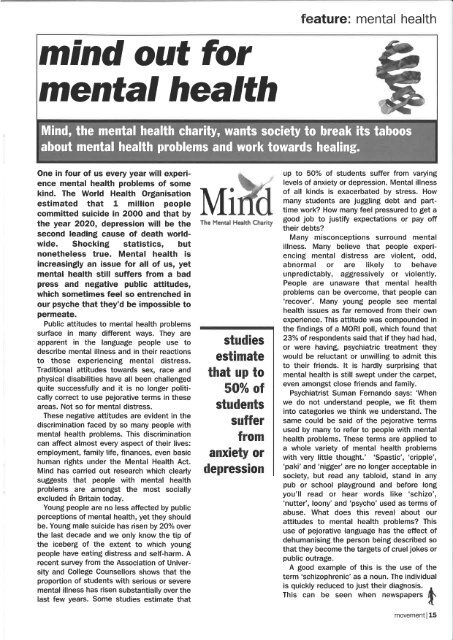Movement 111
Create successful ePaper yourself
Turn your PDF publications into a flip-book with our unique Google optimized e-Paper software.
feature: mental health<br />
mind<br />
a<br />
out for<br />
mental health<br />
Mind, the mental health charity, wants society to break its taboos<br />
about mental health problems and work towards healing.<br />
One in four of us every year will experience<br />
mental health problems of some<br />
kind. The World Health Organisation<br />
estimated that 1, million people<br />
committed suicide in 2000 and that by<br />
the year 2O2O, depression will be the<br />
second leading cause of death worldwide.<br />
Shocking statistics, but<br />
nonetheless true. Mental health is<br />
increasingly an issue for all of us, yet<br />
mental health still suffers from a bad<br />
press and ne€lative public attitudes,<br />
which sometimes feel so entrenched in<br />
our psyche that they'd be impossible to<br />
permeate.<br />
Public attitudes to mental health problems<br />
surface in many different ways. They are<br />
apparent in the language people use to<br />
describe mental illness and in their reactions<br />
to those experiencing mental distress.<br />
Traditional attitudes towards sex, race and<br />
physical disabilities have all been challenged<br />
quite successfully and it is no longer politically<br />
correct to use pejorative terms in these<br />
areas. Not so for mental distress.<br />
These negative attitudes are evident in the<br />
discrimination faced by so many people with<br />
mental health problems. This discrimination<br />
can affect almost every aspect of their lives:<br />
employment, family life, finances, even basic<br />
human rights under the Mental Health Act.<br />
Mind has carried out research which clearly<br />
suggests that people with mental health<br />
problems are amongst the most socially<br />
excluded ih Britain today.<br />
Young people are no less affected by public<br />
perceptions of mental health, yet they should<br />
be. Young male suicide has risen by 2Oo/o over<br />
the last decade and we only know the tip of<br />
the iceberg of the extent to which young<br />
people have eating distress and self-harm. A<br />
recent survey from the Association of University<br />
and College Counsellors shows that the<br />
proportion of students with serious or severe<br />
mental illness has risen substantially over the<br />
last few years. Some studies estimate that<br />
MiM<br />
The Mental Health Charity<br />
studies<br />
estimate<br />
that up to<br />
50% of<br />
students<br />
suffer<br />
from<br />
anxiety or<br />
depression<br />
up to 50% of students suffer from varying<br />
levels of anxiety or depression. Mental illness<br />
of all kinds is exacerbated by stress. How<br />
many students are juggling debt and parttime<br />
work? How many feel pressured to get a<br />
good job to justify expectations or pay off<br />
their debts?<br />
Many misconceptions surround mental<br />
illness. Many believe that people experiencing<br />
mental distress are violent, odd,<br />
abnormal or are likely to behave<br />
unpredictably, aggressively or violently.<br />
People are unaware that mental health<br />
problems can be overcome, that people can<br />
'recover'. Many young people see mental<br />
health issues as far removed from their own<br />
experience. This attitude was compounded in<br />
the findings of a MORI poll, which found that<br />
23%of respondents said that ifthey had had,<br />
or were having, psychiatric treatment they<br />
would be reluctant or unwilling to admit this<br />
to their friends. lt is hardly surprising that<br />
mental health is still swept under the carpet,<br />
even amongst close friends and family.<br />
Psychiatrist Suman Fernando says: 'When<br />
we do not understand people, we fit them<br />
into categories we think we understand. The<br />
same could be said of the pejorative terms<br />
used by many to refer to people with mental<br />
health problems. These terms are applied to<br />
a whole variety of mental health problems<br />
with very little thought.' 'Spastic', 'cripple',<br />
'paki'and 'nigger'are no longer acceptable in<br />
society, but read any tabloid, stand in any<br />
pub or school playground and before long<br />
you'll read or hear words like 'schizo',<br />
'nutter', loony' and 'psycho' used as terms of<br />
abuse. What does this reveal about our<br />
attitudes to mental health problems? This<br />
use of pejorative language has the effect of<br />
dehumanising the person being described so<br />
that they become the targets of cruel jokes or<br />
public outrage.<br />
A good example of this is the use of the<br />
term 'schizophrenic' as a noun. The individual<br />
is quickly reduced to just their diagnosis.<br />
This can be seen when newspapers<br />
I<br />
movement | 15

















